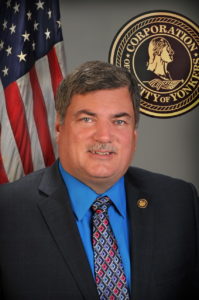Yonkers Department of Public Works
SW: How were you and your department affected by COVID-19?
TM: I don’t think anyone fully expected what came at us when we learned we were one of the
epicenters of the outbreak. It meant we had to immediately think about continuity of government
in the event the virus spread throughout our workforce. We made plans for the Mayor to work
from his home and for others who could work remotely. In my case, I have hundreds of
sanitation, water, and other critical service workers who have to be on call and performing their
duties, and coming from a military background, I felt obliged to lead from the front and show my
support for the men and women of DPW by being visible in City Hall and in the field. We also

had a rapid technology plus-up to upgrade computers with cameras and microphones so we could conduct Zoom and Webex calls with our colleagues and vendors. I suspect this will be the new normal after this crisis is behind us. Unfortunately, we have not yet figured out how to “virtually pick up your garbage” and so by default, my team became part of the essential workers putting themselves at risk. Within the department we took multiple steps to protect our teams as much as possible. We deployed 9 sanitizing trucks by converting our salt spray machines we use for deicing, and also recommissioned a fire truck to spray disinfectant. . We offered our services to grocery stores in the area to spray their shopping carts so they wouldn’t have to be wiped down individually.
SW: How was your team’s health impacted by COVID-19?
TM: I am proud of the fact that only 8 people out of over 360 came down with the virus. We went to great pains to educate our crews that they were not only protecting themselves but ultimately their families’ health. We used our resident medical expert to go into the field and discuss the health risks of the virus with our men and women. It made a real difference in driving the seriousness of the situation home. We made a conscious decision to try and keep resources like the recycling center open since with people being home they are doing spring cleaning or fixing up their homes. We set up social distancing guidelines that allow people to come to the center and dump their trash with little or no contact with on-site staff.
SW: Are there other challenges you faced or lessons learned for you and your team?
TM: The other major challenge we are encountering is a significant increase in litter on the streets and sidewalks. If I
wanted to stress one message above all others it would be for people to be aware that their protective masks and gloves are a biohazard. Sadly, many of them are turning up in our storm drains which means on the West side of the city, the detritus and biohazards are ending up in the Hudson River and on the East side, in the Bronx River. Lessons learned would include the need to stockpile essential supplies and equipment that can be deployed on short notice. I also think as I said previously, we will see Zoom and related technology changing the way we interact with both the public and internally as the new normal.
SW: Is there a message you want to deliver to the community?
TM: Yes, the men and women of the Yonkers Department of Public Works are proud of the role they played during this
crisis, and they are equally grateful for the outpouring of public support for their role on the front line.
The views and opinions posted or expressed on this website on any message board, chat area, bulletin board, forum, or any other interactive area are those of the authors and do not purport to reflect the opinions, views or positions of the Armour Villa Neighborhood Association® or its Board of Directors.